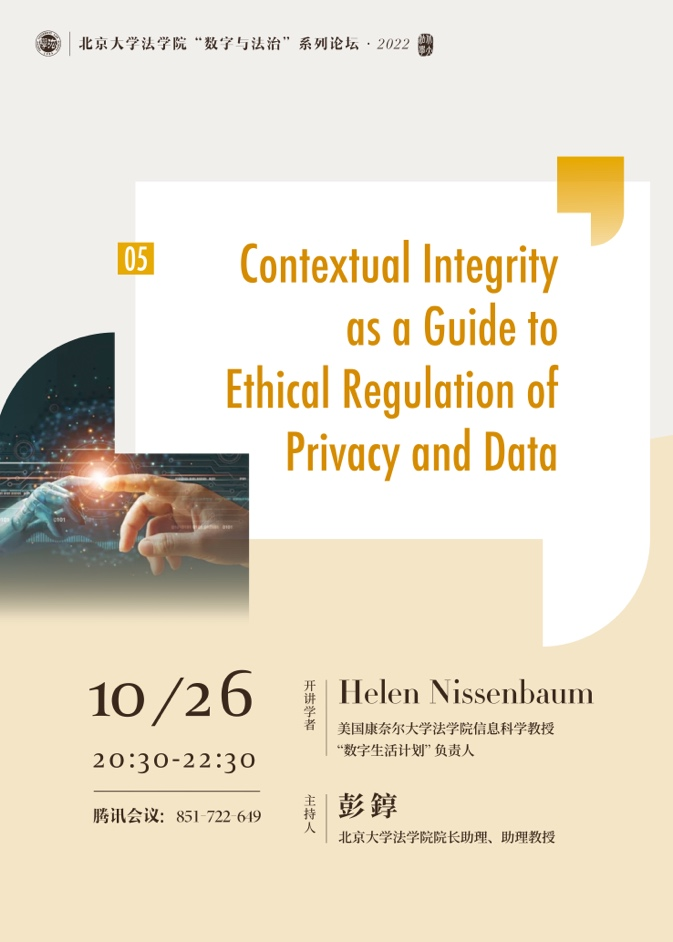Helen Nissenbaum:The Connotation and Application of Contextual Integrity Theory
Date:2023-04-03
The rapid development of digital technology has posed new challenges to the construction of the rule of law in the digital era. Peking University Law School held a series of forums on "Digital and Rule of Law" under the theme of "Privacy and Data Protection Law in a Global Perspective", inviting renowned scholars from Japan, Europe and the United States to discuss this core theme with Chinese scholars.
On October 26, 2022, Helen Nissenbaum, Professor of Information Science at Cornell University Law School and Director of the Digital Life Initiative, was invited to give an online lecture about "Contextual Integrity as Guide to Ethnical Regulation of Privacy and Data" as the fifth lecture in the "Digital and Rule of Law" series at Peking University Law School. The lecture was hosted by Peng Chun, Assistant Professor and Assistant Dean of Peking University Law School. Nearly 300 students and faculty members from both inside and outside the campus were attracted to this lecture.

The core points of the lecture are listed below.
Helen Nissenbaum:
Contextual Integrity Theory intends to respond to the challenges posed by technology by proposing a concept of privacy with ethical connotations and to draw boundaries for privacy. The basic idea of the theory is that privacy is the reasonable flow of information. Privacy does not require secrecy or the least possible flow of information, since almost all social relationships depend on the flow of information for their establishment and existence. Reasonable flows are those that are compatible with the social norms of the scenario, i.e., the individual's reasonable expectation of privacy. Contextual Integrity Theory assumes that the society can be divided into different social contexts such as health, education, family, and finance. Each domain constitutes a "context" which is defined by its purpose. There are national and cultural differences in norms of contexts.
The flow of information in Contextual Integrity Theory consists of five elements: the subject who has the information, the subject to whom the content of the information relates, the sender of the information, the receiver of the information, and the type of information. When any of the five elements changes, the nature of the information flow will be different. Therefore, according to Contextual Integrity Theory, it is impossible to distinguish between public information and sensitive personal information based only on the nature of the information itself, and it is necessary to combine with the five factors to make a judgment. In applying Contextual Integrity Theory, the five aforementioned elements are used to describe the information flow, look for relevant norms or expectations, and then examine whether there is any inconsistency between the activity and the corresponding norms.
Contextual Integrity Theory does not support personal control on information. There is no concept of "someone's information" under this theory. It is because that the principle requiring control on personal information can be transformed into informed consent rules, but many empirical studies show that individuals simply do not understand or even read privacy policies because they are very complex and beyond their cognitive abilities. It means that individuals are easily manipulated and have no control on the information at all.
Contextual Integrity Theory provides three levels of judging criteria for context norms or information flow. The first level is whether freedom, such as freedom of expression, can be promoted. The second level is whether security can be ensured. The third level, which is unique to and most important to Contextual Integrity Theory, is whether the flow of information promotes important values or purposes. Introducing Contextual Integrity Theory into policy is not difficult, but it requires expertise in each specific area.
Contextual Integrity Theory provides a positive conception of privacy. Under this theory, privacy is beneficial to society and supports a number of social values such as fairness, justice, security and freedom.
Speaker Bio:
Helen Nissenbaum is a professor of information science at Cornell University Law School and the director of the Digital Life Initiative. Her research focuses on data privacy protection and information technology. She is a leading expert in privacy research in the United States and the originator of Contextual Integrity Theory. Her theories have influenced U.S. legislation and justice, leading the country out of the haze of complete personal control on personal information and into a new era of more flexible personal information protection to meet the needs of big data applications. Her research in privacy security has been supported by grants from the National Science Foundation, the Air Force Office of Scientific Research, and the Office of the National Coordinator of the U.S. Department of Health and Human Services. Professor Nissenbaum also holds professorships in Media, Culture and Communication and Computer Science at New York University and is the Director of the Information Law Institute.



